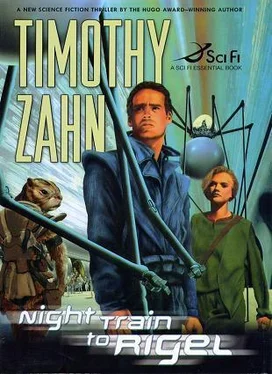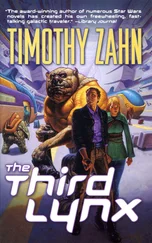Even political differences didn’t seem to matter. The Juriani and Cimmaheem were currently embroiled in a major controversy regarding the development of a half dozen worlds bordering their empires, yet I saw a mixed group of them sitting around a table playing a card game and chatting quite amicably.
The bar end of the first-class dining car was much the same, with the social lubricant of alcohol and other intoxicants adding an extra layer of goodwill and camaraderie. Only in the restaurant section did the travelers largely segregate themselves, and I suspected that had more to do with the challenges of species-specific food aromas than any xenophobia.
The car in front of the dining car contained more first-class seating, with more of the social mixing I’d already seen. Finally, in the compartment car ahead of that one, we reached our new home.
It was as nice as I’d expected, and then some. It was small, of course, but the space had been utilized so efficiently that it didn’t feel at all cramped. Attached to the front wall was a narrow but comfortable-looking bed that could be folded up for extra floor space. Above the bed was a luggage rack with my two carrybags sitting neatly side by side. Against the outer wall was a lounge chair with a swivel computer beside it on one side and an expansive display window—currently blank—on the other. On the opposite side of the display window was a fold-down clothes rack, with memory-plastic hook/hangers that could stretch or shrink as needed, plus a built-in sonic cleaning system with a quick-turn cycle for half-hour freshening. A tiny human-configured half bath was tucked into the corner beside the door, the whole cubicle converting into a shower stall for use after long overnight trips. Finally, the back wall contained a curve couch with a set of reading and ambiance lights strategically placed above it. The room was done up in a tasteful color scheme, with decorative moldings and small cameo-style carvings where the walls and ceiling met “I could get used to this,” I commented as I circled the room, touching the various controls and running my fingers over the moldings and the sections of polished wood and metal. The lounge chair had a leathery feel to it, while the curve couch was done up in something midway between velvet and very soft feathers.
“I trust you’ll find it adequate,” Bayta said. She stepped past me as I finished my tour and touched a control beneath the display window. In response, the curve couch and lights collapsed neatly into the back wall, which then retracted into the side of the half-bath cubicle to reveal a mirror image of the compartment we were standing in. “This one’s mine,” she said, a subtle note of warning in her tone.
“Of course,” I said. Not that I was likely to have made a swing for her even if I hadn’t had more important business on my mind. Walking back to my bed, I reached up to the luggage rack and hauled down the smaller of my two carrybags.
And as I did so, a quiet alarm went off in the back of my skull. Earlier, when I’d carried the bags out of the transfer station restaurant, the leatherlite grip that rode the handle straps had been flexible, even a little squishy. Now there was virtually no give to the grip at all. “Bayta, can you pull up a dining car menu for me?” I asked casually as I popped the bag open.
“Certainly,” she said, sitting down in the lounge chair and swiveling the computer around to face her.
And with her attention now safely occupied, I gave the handle a close look.
The reason for the change in its feel was instantly obvious. The space between the grip and the strap, the looseness of which had given the handle its squishiness, had been completely filled in, like an éclair with a double helping of cream. The material matched the leatherlite’s color and texture perfectly, but somehow I doubted that was what it was.
“Here it is,” Bayta announced, swiveling the display around. “But I thought you ate at Terra Station.”
“A good traveler learns to eat whenever he gets the chance,” I said, stepping to her side and paging quickly through the menu. “I don’t suppose first-class has delivery privileges.”
“Not usually,” she said. “Do you want me to ask one of the servers or conductors if he’ll bring you something?”
“No, thanks,” I said. “That’s what I’ve got you for. Be a good girl and go get me an order of onion rings, will you?”
In the past, I’d found the be-a-good-girl line to be a remarkably effective way of getting a quick reading on a woman’s temperament. Unlike most of those I’d tried it on, Bayta didn’t even bat an eye. “As you wish,” she said, sliding out of the chair. Crossing the compartment, she touched the door control to open it and disappeared into the corridor.
I went over to the door and made sure it was locked. Then, returning to the bed, I hauled down the other carrybag. In a galaxy where self-propelled luggage was the norm, I doubted that one in a hundred travelers had more than a vague idea what their handles really felt like. The only reason I’d caught the alteration so quickly was because of my carrybags’ chronic motor problems, the very problems I’d been cursing five hours ago.
There was a lesson there, or at least a bit of irony, but at the moment I couldn’t be bothered with either. Like the smaller carrybag, the larger one’s handle had also been padded out. Pulling out my pocket multitool, I extended the fingertip-sized blade—the biggest knife permitted aboard a Quadrail—and began digging carefully beneath the grip.
My first guess was that the Spiders had decided to backstop their watchdog by planting a tracer or transmitter on me. But as I scraped millimeter after millimeter away without finding anything except whisker-thin embedded wires, that idea began to fade. I kept at it; and finally, two centimeters in, I struck something familiar.
Only it wasn’t a transmitter. It was, instead, a short-range receiver connected to a small pulse capacitor, which was in turn connected to the whisker wires buried in the material.
The sort of setup you might find in a remotely triggered antipersonnel bomb.
Pulling out my reader, I selected a data chip from my collection marked Encyclopaedia Britannica . So Bayta had a specially-gimmicked reader, did she? Fine. So did I. Plugging in the chip, I touched the reader’s activation control and held one corner close to the material I’d scraped out of the handle.
It was not, in fact, a bomb, antipersonnel or otherwise. This sensor was the most advanced bit of technology in the Terran Confederation, a gadget any Westali field director would probably give his best friend’s right arm for, and it wasn’t picking up even a hint of the fast-burning chemicals all explosives had in common. I retuned the sensor twice, just to be sure, then switched to scanning for poisons. Again, nothing.
But nothing in the case of poisons could merely mean that the stuff was too well disguised for a normal scan. Fortunately, there were ways of teasing such things into the open. Pulling out my lighter, I flipped the thumb guard around, swinging it over the flame jet where it would serve as a specimen holder. I put a single grain of the mystery material on top, set the sensor at the proper reading distance, and ignited the lighter. The flame hissed out, clean and blue-white, and there was a brief burst of pale smoke as the grain burned as well. Shutting off the lighter, I set it aside and keyed for analysis.
And this time, the sensor finally found the active ingredient carefully buried beneath the inert containment matrix.
Saarix-5 nerve gas.
The image of the Spiders’ dead messenger rose unpleasantly in front of my eyes as I unplugged the data chip and returned it and the reader to my pocket. In the absence of any move against me during the voyage from Earth, I’d begun to wonder if his death might have been a bizarre coincidence, the result of some random crime that had nothing to do with me.
Читать дальше


